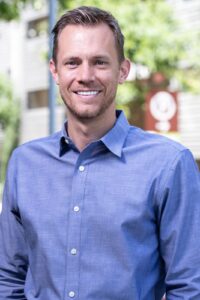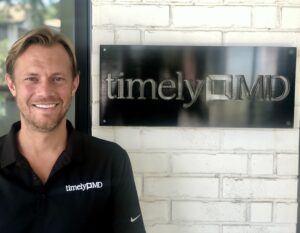“See a need, fill a need.” That’s a phrase used often when talking about leadership, particularly servant leadership. It’s a phrase Chris Clark (’01) has put into practice since graduating from ACU as a management and marketing major.
leadership. It’s a phrase Chris Clark (’01) has put into practice since graduating from ACU as a management and marketing major.
As the co-owner of TimelyMD, an online telehealth provider focusing on colleges and universities, Clark has searched for ways to serve others while offering help and healing to often marginalized communities. Along the way, he’s continued to show his gratitude to his alma mater saying, “ACU helped us and now we want to give back.”
TimelyMD might never have been born were it not for ACU. Founded by alumni Clark, Luke Hejl (’01) and Dr. Alan Dennington (’01), the university not only brought the three partners together but offered the opportunity to see their idea launched. The company’s seed investors were all alumni. ACU was the first client, signing a contract for what is now known as “Wildcat Care” before the company’s operational launch and encouraging other institutions to engage the company’s services.
Now TimelyMD serves almost 100 institutions and half a million students. Not only has its growth been exponential, but what started as a medical-only company five years ago has pivoted to serve students in a broader way, adding mental and behavioral health services.
In the beginning, behavioral health wasn’t even on the partners’ radar, Clark said. However, when they started canvassing colleges, the message from higher education institutions was clear: “It’s great that you can treat pink eye, but our real needs are on the behavioral health side.”
Pre-pandemic, 60 percent of TimelyMD visits dealt with medical issues and fewer than 40 percent involved behavioral health. When the pandemic hit, the numbers were reversed; two-thirds of the visits now involve behavioral or mental health and one-third are medical.
Stressors brought on by the pandemic served to accelerate the business’s growth. As a former pharmaceutical sales rep, Clark understood how long it could take to build relationships with potential clients. Pre-pandemic, the sales cycle with colleges was generally 12 to 36 months before a decision would be made to engage the company’s services.
When COVID-19 hit, many students were sent home as institutions turned to online learning. As students returned to their home states, colleges and universities that wanted to continue offering health services faced a dilemma: How would they provide care in a state in which their campus providers might not be licensed?
At the same time, students’ anxiety levels increased, compounded by social isolation and loneliness, as they worried about their academic performance and their future. As many institutions remained closed for the remainder of the academic year in 2020 and into 2021, telehealth came into the spotlight.
TimelyMD was ready for the challenge and the much-shortened sales cycle. The company had already been working on a national infrastructure plan for expansion. The blueprint was in place and allowed the company to rapidly deliver short-term, customized solutions for institutions such as Duke and Johns Hopkins.
Although TimelyMD was founded initially to fill a gap in the higher education healthcare system, Clark says his fulfillment and inspiration comes in seeing how the lives of students are transformed.
 “People are so passionate about what we are doing,” he said. “I realize we truly may be saving a life, intervening in crises or changing the world in a positive way. We’re working with some institutions with a very high percentage of first-generation college students who aren’t accustomed to the level of care we’re providing, especially on the mental health side. It’s definitely what makes me wake up in the morning, knowing we are truly improving the health of students.”
“People are so passionate about what we are doing,” he said. “I realize we truly may be saving a life, intervening in crises or changing the world in a positive way. We’re working with some institutions with a very high percentage of first-generation college students who aren’t accustomed to the level of care we’re providing, especially on the mental health side. It’s definitely what makes me wake up in the morning, knowing we are truly improving the health of students.”
As TimelyMD continues to grow, Clark sees an opportunity to reach marginalized communities in a way virtual health has not been able to do before. “When I was in school, behavioral health was swept under the rug; today we are dealing with it in a different way,” he said. It’s been especially fulfilling to see the mental health services embraced by students and institutions alike, he said.
The lessons Clark learned on the ACU campus have equipped him for marrying his academic knowledge with his faith as he has grown his business.
“In COBA, specifically, learning how to lead and learning from Christian leaders is probably what equipped me to help lead TimelyMD today,” Clark said. “The presentations we had to give, the debates, position papers and learning to stand behind our position were all really helpful.”
He especially appreciates the lessons he learned at COBA’s Leadership Summit.
“Leadership Summit was really about servant leadership,” he said. “I can’t tell you the content that was shared, but what I do remember is that faith was important to the business leaders who came in. They talked about how they incorporated their faith into their daily lives in leading an organization and it was really powerful for me. I don’t do a perfect job of that but I try to lead in that way, too. While I won’t shove it down anyone’s throat, for people to know that my faith is important to me, that it does guide me in what I do and how I do it, is important.”
Aside from meeting his wife, Merry (Lacy) Clark (‘00), his favorite memories from his time at ACU involve the student opportunities offered to him. Clark encourages current students to look at their college experience holistically.
“It’s much more than going to class and group projects,” he said. “It’s things like participating in committees, going to Leadership Summit, going to professors’ homes for meals. It was an amazing experience to be able to do that. Outside of class, I would say it’s getting as involved as you can. I was involved with SGA serving as the freshman and sophomore class president. Whatever it may be, Sing Song, Wildcat Week, etc., it’s important to find all the different ways to build community.”